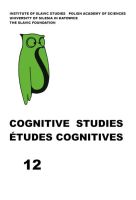Polish-Bulgarian-Russian, Bulgarian-Polish-Russian or Russian-Bulgarian-Polish Dictionary?
Polish-Bulgarian-Russian, Bulgarian-Polish-Russian or Russian-Bulgarian-Polish Dictionary?
Author(s): Violetta Koseska-Toszewa, Maksim Duszkin, Joanna Satoła-StaśkowiakSubject(s): Language and Literature Studies
Published by: Instytut Slawistyki Polskiej Akademii Nauk
Keywords: trilingual dictionary; form; meaning; semantic classifiers; state; event; classic classifiers; intransitive; transitive; temporal-aspect relation
Summary/Abstract: The trilingual dictionary (M.Duszkin, V.Koseska, J.Satoła and A.Tzoneva) is being elaborated based on a working Polish-Bulgarian-Russian electronic parallel corpus authored by Maksim Duszkin, Violetta Koseska-Toszewa and Joanna Satoła-Staśkowiak, and works by A.Tzoneva. It is the first corpus comparing languages belonging to three different Slavic language groups: western, southern and eastern. Works on the dictionary are based on Gramatyka konfrontatywna bułgarsko-polska (Bulgarian-Polish confrontative grammar) and the proposed there semantic-oriented interlanguage. Two types of classifiers have been introduced into the dictionary: classic and semantic. The trilingual dictionary will present a consistent and homogeneous set of facts of grammar and semantics. The Authors point out that in a traditional dictionary it is not clear for example whether aspect should be understood as imperfective / perfective form of a verb or as its meaning. Therefore in the dictionary forms and meaning are separated in a regular way. Imperfective verb form has two meanings: state and configuration of states and events culminating in state. Also perfective verb form has two meanings: event and configuration of states and events culminating in event. These meanings are described by the semantic classifiers, respectively, state and event, state1 and event1. The way of describing language units, mentioned in the article, gives a possibility to present language material (Polish, Bulgarian, Russian) in any required order, hence the article’s title
Journal: Cognitive Studies | Études cognitives
- Issue Year: 2012
- Issue No: 12
- Page Range: 27-38
- Page Count: 12
- Language: English

